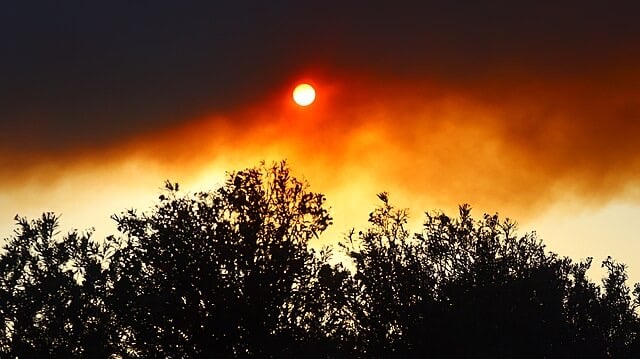Turkey faces its worst wildfire crisis of the summer as devastating blazes sweep across the Mediterranean coast, prompting President Recep Tayyip Erdogan to warn of a “truly great disaster” that has claimed 13 lives and forced thousands from their homes.
Terrifying images showed flames and smoke billowing into the sky close to high-rise apartment buildings in the tourist hotspot of Antalya on Friday, as new fires erupted along Turkey’s Mediterranean coastline. The government declared Izmir and Bilecik provinces as “disaster areas affecting public life” after a month of relentless fires across the country.
Emergency services battled multiple blazes in Antalya, Adana, Mersin, Eskisehir and Karabuk, with firefighters struggling against strong winds and extreme temperatures that reached a record-breaking 46.1C (115F) in Antalya city – the highest July temperature since records began in 1930.
Erdogan Mobilises 25,000 Personnel
Speaking after Friday prayers, President Erdogan acknowledged the scale of the emergency, stating that Turkey was “faced with a truly great disaster.” The president revealed that 25,000 personnel were fighting fires across the country, supported by 27 planes, 105 helicopters and 6,000 ground vehicles.
“We are mobilising all our resources to combat these fires,” Erdogan said, as the death toll rose to 13, including 10 rescue volunteers and forestry workers who were killed on Wednesday in Eskisehir province when winds suddenly changed direction, causing flames to shift rapidly and surround the victims.
Interior Minister Ali Yerlikaya confirmed that 311 homes had been destroyed or seriously damaged during the monthlong blazes, with 85 temporary housing units set up across three western provinces for those made homeless. Between 27 June and Thursday, residents from 120 neighbourhoods nationwide were evacuated, with more than 12,000 workers under the ministry’s authority fighting the fires.
Tourist Areas Under Threat
The fires posed particular danger in Antalya, where local and foreign visitors flock during the summer months. Homes were evacuated in the city centre and the outlying district of Aksu as flames advanced, with the privately owned news agency DHA reporting that a major coastal road was forced to close.
Further along the coast, homes in Manavgat were also threatened, prompting desperate scenes as local residents grabbed hoses and buckets to assist firefighters. Water-dropping helicopters and planes battled the flames from above, whilst police water cannons and municipal water trucks were enlisted in the firefighting efforts.
Antalya Governor Hulusi Sahin described the situation as “truly disturbing and dangerous, because they occurred in city centres, among houses.” He confirmed evacuations had taken place but reported no deaths or injuries in the immediate area, though fires in Aksu were “showing a tendency to grow” and another in Gazipasa, east of Manavgat, remained concerning.
Climate Change Fuels Mediterranean Inferno
The wildfires have been exacerbated by temperatures above seasonal norms, strong winds and dry conditions resulting in dozens of fires since late June. Turkey’s coastal regions have in recent years been ravaged by wildfires as summers have become hotter and drier, which scientists attribute to human-induced climate change.
The 2024 Turkey wildfires represent a continuation of increasingly severe fire seasons, with experts noting that between 2014 and 2024, Antalya Province lost the largest area of forest to fires. Climate change has extended the traditional fire season from late June to September, now stretching from May through to late September.
Agriculture and Forestry Minister Ibrahim Yumakli warned that the combination of strong winds and blazing heat was creating extremely dangerous conditions across the country. The minister noted that over 20% of the area burnt from 2015 to 2024 was due to electricity distribution faults, highlighting infrastructure vulnerabilities in extreme weather conditions.
Regional Crisis as Cyprus Battles Historic Fires
The wildfire crisis extended beyond Turkey’s borders, with neighbouring Cyprus experiencing what authorities described as the worst wildfires in 50 years. Two people were found dead in a burnt-out car on the Monagri-Alassa road near Limassol, with at least 26 injured and dozens of homes destroyed.
Temperatures on the Mediterranean island peaked at 44C, triggering amber weather alerts and forcing the evacuation of more than 100 people from districts in Limassol and Paphos. The blaze consumed 38.6 square miles of forested hillsides on the southern side of Cyprus’s Troodos mountain range.
Cyprus called for international assistance, with aircraft and helicopters arriving from Jordan, Egypt, Israel, Spain and Lebanon, whilst an RAF Chinook helicopter from British bases on the island joined firefighting efforts. Police are investigating claims of arson after eyewitnesses reported the fire was started deliberately at two separate points near a rubbish dump.
International Response
The heat wave affecting the eastern Mediterranean region has prompted international cooperation in firefighting efforts. Albania reported 1,000 firefighters and soldiers battling flames as temperatures reached 42C (107F), whilst the broader Mediterranean basin experienced marine heatwave conditions.
Spain announced it would send two firefighting planes to assist Cyprus, joining efforts from multiple nations as the region grapples with what climatologists warn are climate change-linked conditions causing record-breaking temperatures across the Mediterranean.
Long-Term Implications
The 2024 wildfire season highlights Turkey’s growing vulnerability to extreme weather events. Historical data shows that July and August 2021 saw more than 200 wildfires burn 1,700 square kilometres of forest in Turkey’s Mediterranean Region in the worst-ever wildfire season in the country’s history until that point.
With urbanisation, tourism development and climate change creating a perfect storm of conditions for catastrophic fires, Turkish authorities face mounting pressure to improve fire prevention, forest management and emergency response capabilities. The designation of Izmir and Bilecik as disaster areas represents an acknowledgement of the severity of the crisis, one step below the most serious level of emergency declaration.
As communities across Turkey’s Mediterranean coast count the cost of another devastating fire season, questions remain about the country’s preparedness for future climate-related disasters in an increasingly warming world.
Follow for more updates on Britannia Daily
Image Credit:
2025 İzmir wildfires – Photo by Zeynel Cebeci, licensed under CC BY-SA 4.0, via Wikimedia Commons.



